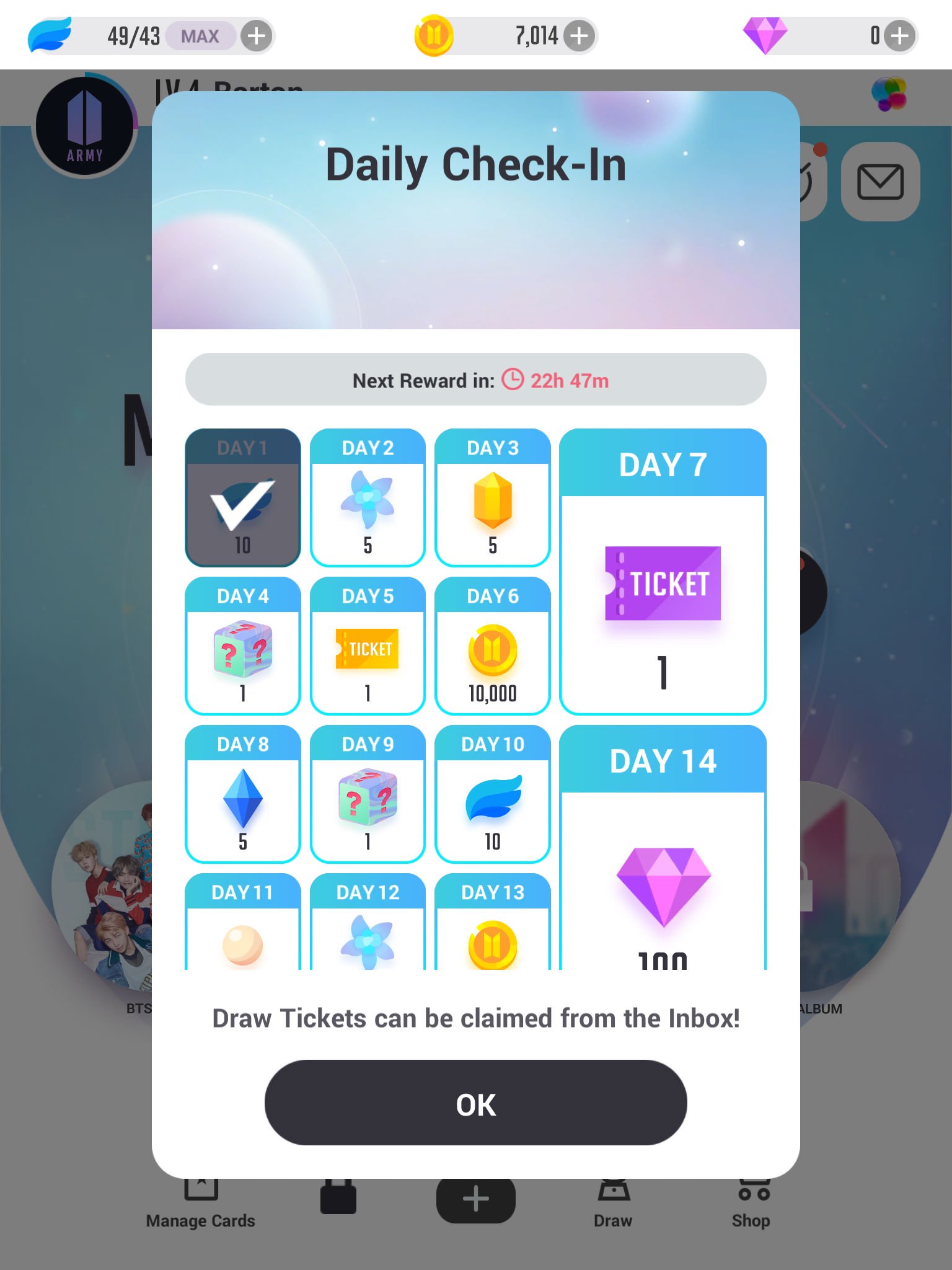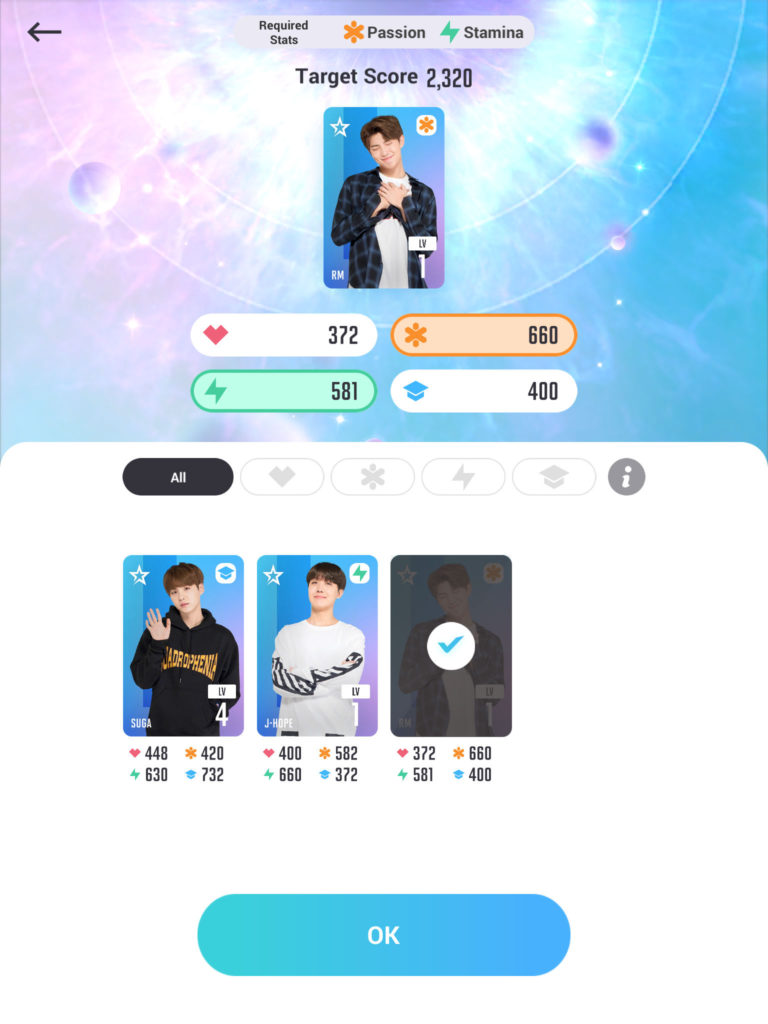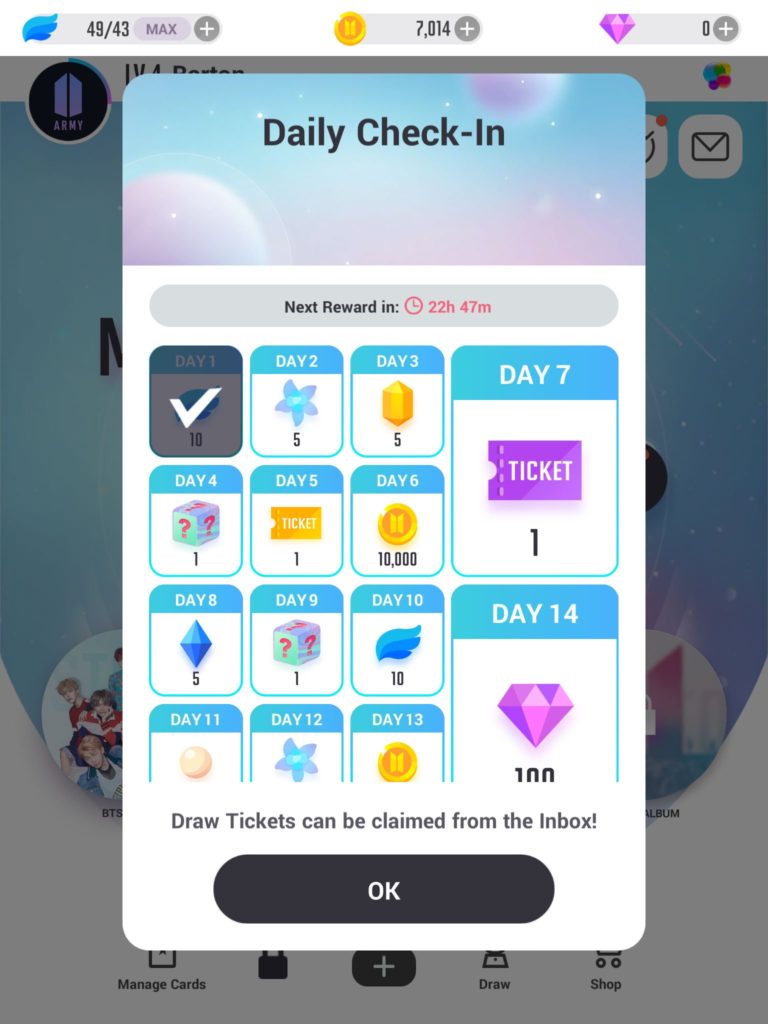
Gatcha Game Superstitions
Like any gacha game, K-pop band manager simulator BTS World is primarily dependent on luck. And yet after playing it for almost a year, I suddenly find myself with a whole series of personal superstitions that might just bless me with good fortune.
The gacha mechanic, popular among free to play mobile games like Fate/Grand Order, Granblue Fantasy, and Fire Emblem: Heroes, comes from the Japanese word “gachapon,” an onomatopoeia for the sound of toy spheres dropping from randomized vending machines. In short, gacha games allow the player to roll at chance for rewards of various quality, with the best being the rarest. In BTS World, these rewards are photocards with shots of the band members, which have stats that can be used to progress through the story.
This process is supposed to be inherently random. But I’m far from the only person who believes there must be a way to influence that same process. In all sorts of gacha games, people are convinced they can fix their luck.
The methods are varied. Only pull at work – it’s a lucky spot somehow, a place where you get rewarded. Never pull at work – the game “knows” you’re supposed to be doing something else and will punish you. Get someone else to pull for you. Hold your breath. Internally scream ‘5 star!’ as you pull for the best rarity.
These rituals – particularly silly ones like the last – become memes in the game’s communities. “My personal ritual is to do the event draws the day they are released,” says Tayvaish, one of the moderators for BTS World’s subreddit, referring to timed periods when new cards are available. “It’s not a guarantee…but I’ve noticed I’ve gotten a few event cards that way.”
Pull timing is a big one in the BTS World community; drawing right after the game’s daily reset is also supposed to raise the chance of cards with good stats. “There’s no clear logic to that,” Tayvaish says. “Everyone’s kinda encountered it though!”
Everyone here includes me. The game’s reset is 2pm Korean Standard Time or 5 in the morning in my timezone, so I would never usually pull then. But on a trip to Korea last year, in the appropriate timezone, I got to try it out, and I did find myself unusually lucky.
Or it could just have been my perception. Psychologist Jamie Madigan, author of Getting Gamers: The Psychology of Video Games and Their Impact on the People Who Play Them, says it’s probably just down to the way our brains work.
“Humans are really good at pattern recognition – so good that we sometimes see them when things are actually random,” Madigan explains. “Whenever we get a reward…we often can’t help but try to make associations between that thing and other things that just happened. We want a cause to associate with the effect so that we can figure out how to get more of a good thing. These false associations lead to superstitions and rituals that we think (or at least hope) will lead to more good outcomes.”
I remember learning about B. F. Skinner’s psychological experiments to determine superstition in pigeons as a kid. It’s not the one that gave us the term often applied to randomised rewards in games and gambling, the Skinner box, but it’s still instructive here. Caged birds were given food at random intervals, no matter their behavior. But he found that they began to associate the food delivery with whatever they had happened to do just before it, developing rituals they believed would lead to reward. One spun counter clockwise, another touched its head to a certain corner, and so on. The experiment has its critics, but it’s likely that the same behavior is observable in humans. For example, in gacha games.
Since learning about it, I’ve also seen this behavior in myself plenty of times. I refer to it as “pigeoning.” And yet I still do it. Sometimes unintentionally, until I catch myself. But in a game like BTS World, it adds to the fun. I’ve never spent any money on the game, so it doesn’t have a negative impact on any other aspect of my life, either.
Though gacha games certainly can influence their players into spending far more than they can afford. They do this through a number of psychological tricks. “One of the biggest is using fake currencies,” says Madigan. “Our brains are efficient, which means they can be lazy under some circumstances, like dealing with conversion rates. If you paid $5 for 100 gold coins and spent 30 of them on an in-game item, how much did that item cost? We tend not to do the math, which leads to spending more than we realize.”
In BTS World your real cash buys gems, which can then be used for all sorts of purposes, further confusing the conversion rate. 20 gems, enough for one pull, are $0.99, but if I want to speed up a grinding event that’ll only buy me 20 minutes. They’re also impossible to buy alone, only coming bundled with one or more of the game’s other currencies, presumably further tricking the brain into thinking it’s getting a good deal. (Though it can backfire – I’ve never spent money in BTS World and not being able to figure out exactly what the best deal is has certainly slowed me down enough to reconsider during moments of spontaneous temptation.)
It’s possible that other such tricks really do take advantage of how we perceive luck. Kotaku writer Heather Alexandra recently expressed her belief that these sorts of games have a mechanism built-in that rewards players who return after a period of time off with a great pull. “I’m basing this off anecdotal evidence, which I’m sure internet quibblers will totally not freak out about,” she writes. “But I’m fairly confident after six years and around seven gacha games. You’re not lucky. It’s a ploy—an intoxicating one. The result gives you a taste of success and spikes those delicious endorphins to draw you back in and retain you as a player. It maintains the facade that it’s random so that players might believe they’re lucky, but it’s little more than an engineered result. There is something going on here. Because, hey! If you were lucky now, you could get lucky on the next draw.”
There’s probably no way to conclusively prove this, owing to the secrecy of developers holding these cards tightly to their chest. But I believe it. Along with the relative obscurity of game systems, and the workaround tricks they sometimes use lends weight to other superstitions. For example, though Tayvaish says there’s no particular reason behind the community’s belief in the reset time pull superstition in BTS World, I’ve seen a theory that the random number generator might be on a specific pattern tied to the real time clock, biased towards those minutes after reset. It might not seem plausible, unless you know that this is something other games do. For example, it’s exploited to get a really fast Pokémon Crystal speedrun.
It probably isn’t true that BTS World uses any similar mechanic. Madigan explains that we’re more likely to fall for fallacies like this because “true randomness is pretty rare in nature,” whereas games use randomness very often. But the potential that it could lends credence to people’s superstitions because game systems are so often opaque, and because gacha games use so many tricks to encourage spending.
For example, during the reporting for this piece I became half-convinced by a post I read on the BTS World subreddit that claimed watching all the flashy animations, instead of clicking through to skip them, gave better results. Those animations are designed to increase the psychological draw of the pulls, in the hopes you’ll spend money on more, so it feels plausible that watching them could increase your odds.
And while it’s all a bit of fun for some players, for others it might also have big impacts on their thinking. In a thread on the subreddit for gacha mobile game Fate/Grand Order, a player asks what superstitions people believe in. The most highly voted answer is by a user who goes by Sdarkpaladin, who says that they believe “a string of bad luck precludes a string of good luck.” Those frustrated with pulling over and over and getting nothing might stay trapped in the loop as they believe their luck is about to change. “It’s totally gambler’s fallacy,” says Sdarkpaladin. “But goddamit has it been so true to me.”
Gambler’s fallacy famously once caused players to lose millions collectively at the Monte-Carlo casino in 1913, after a roulette wheel landed on black 26 times in a row. Gamblers queued up to put money on red, as though the chance was better and better as the black streak increased. The same likely goes for some individual gacha players. But in many games the chance of getting a top pull is already very low – 1 percent in BTS World. Players would have to spend the equivalent of about $200 to pull 100 times.
This is not a theoretical: Vulnerable people are struggling with gacha and loot box based games. In a VICE article by Ellen McGrody, one anonymous interviewee who described themselves as having an addiction said that they were spurred on by the thought that “one failed attempt means an attempt closer to success.” Others described financial ruin and thoughts of self harm and suicide after spending large amounts.
Whether any of these rituals and superstitions have an impact on the game or not is impossible to say for certain. But what is clear is that encouraging them is another way gacha games wring money from their players. It’s unlikely that the companies profiting are going to change while it rakes in money, and by tapping into fundamental human psychology, they’ve created a mechanic that’s not easy to mitigate. For those of us who take tricks that might just work as part of the fun, it’s important to remember that it leaves others struggling.







